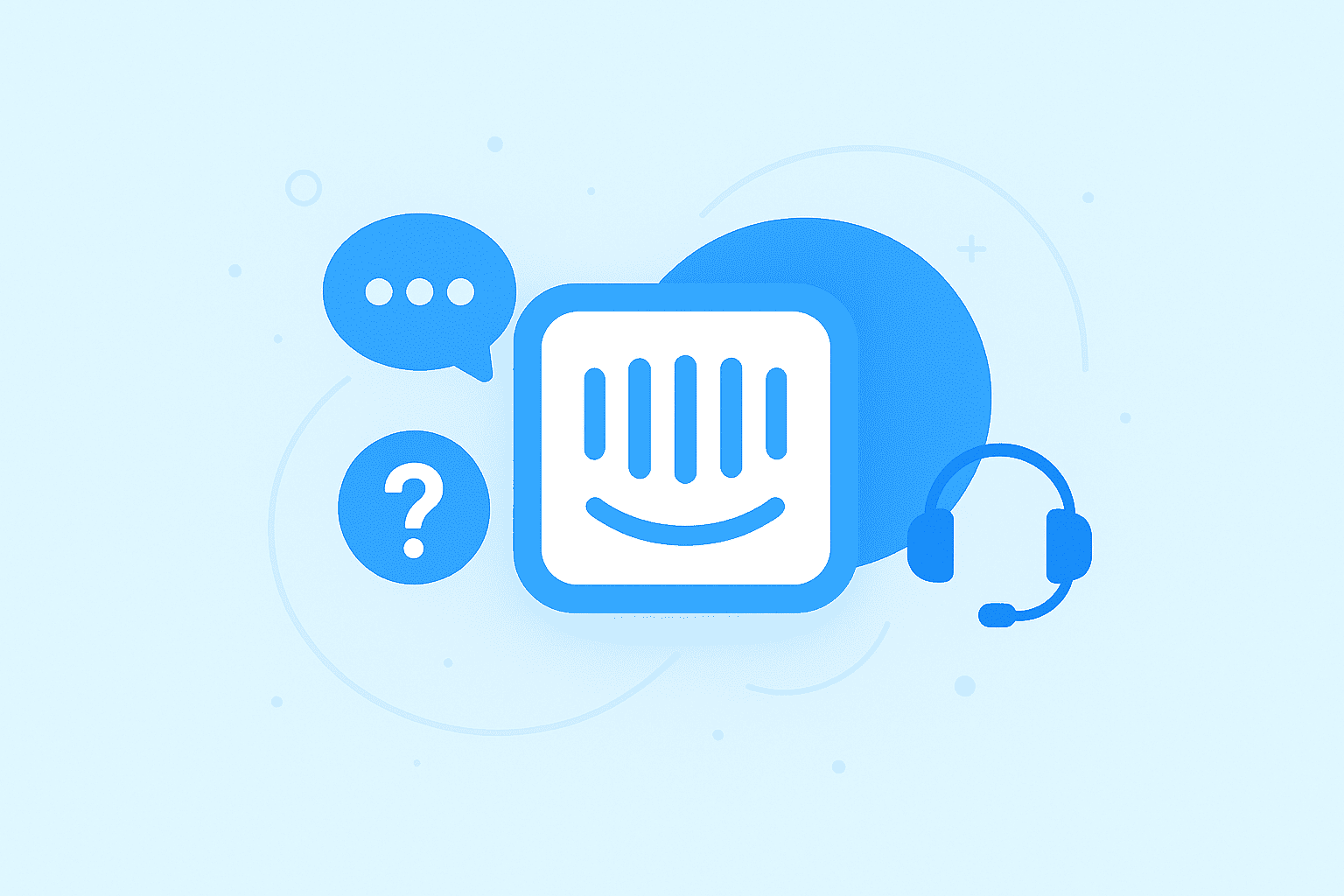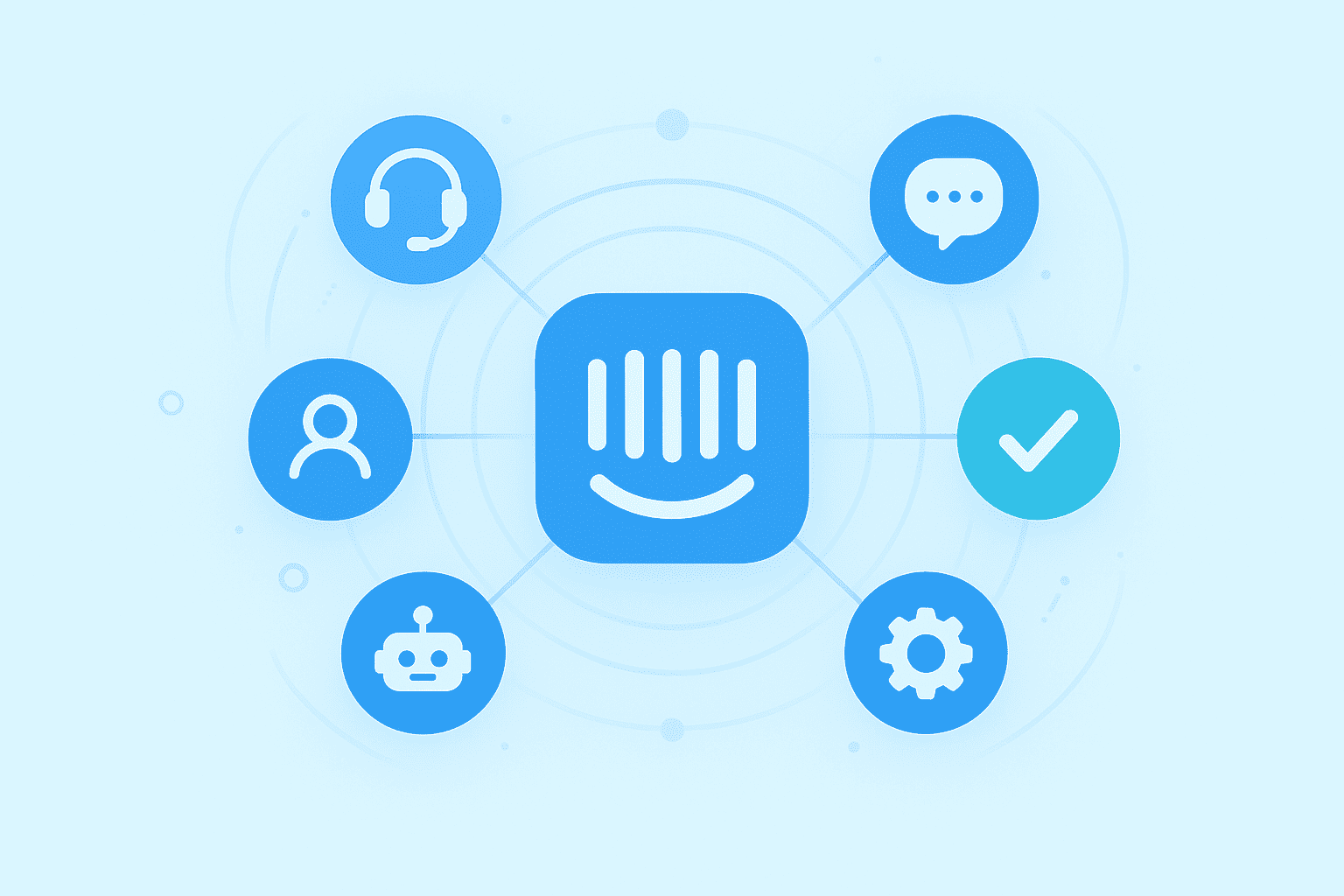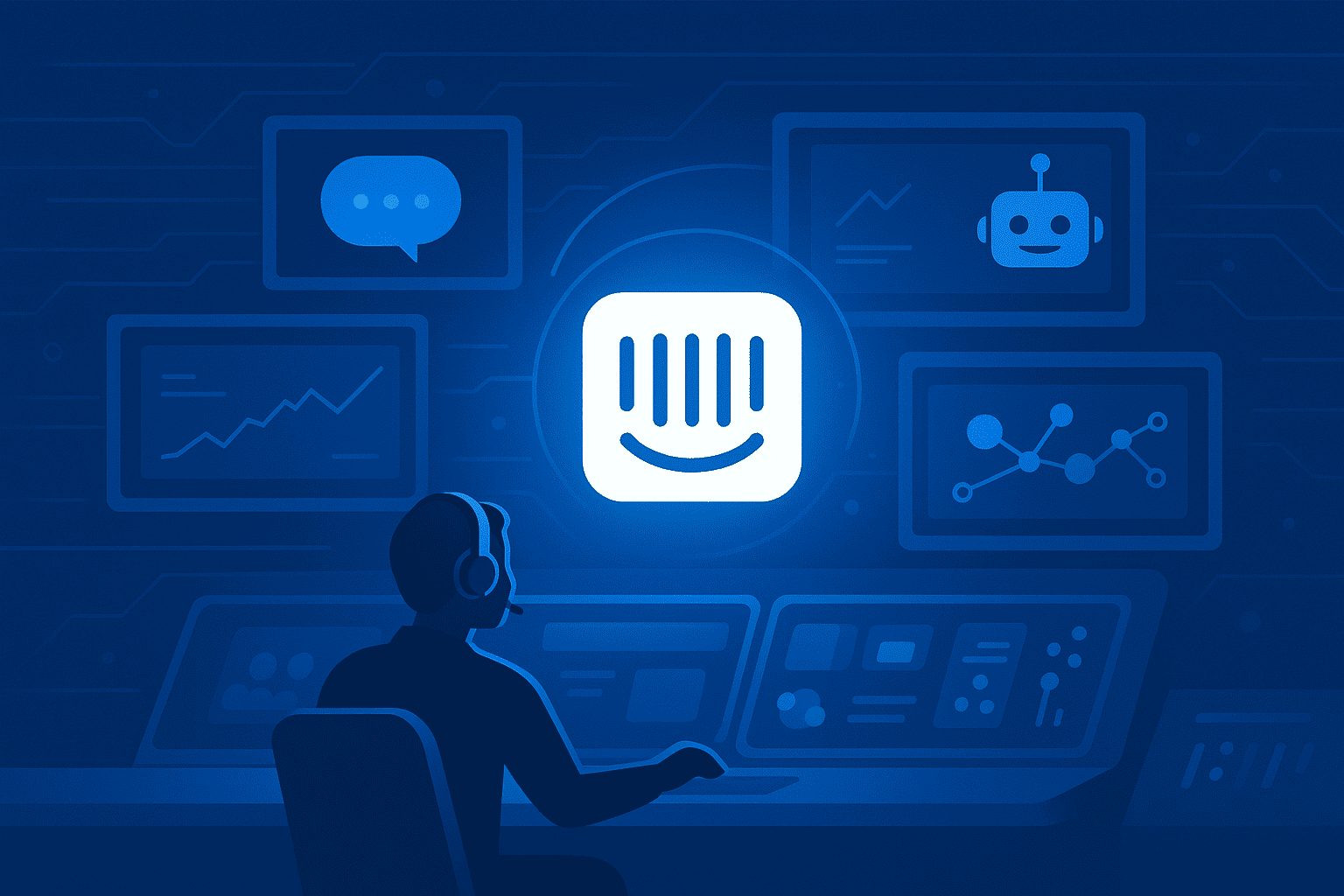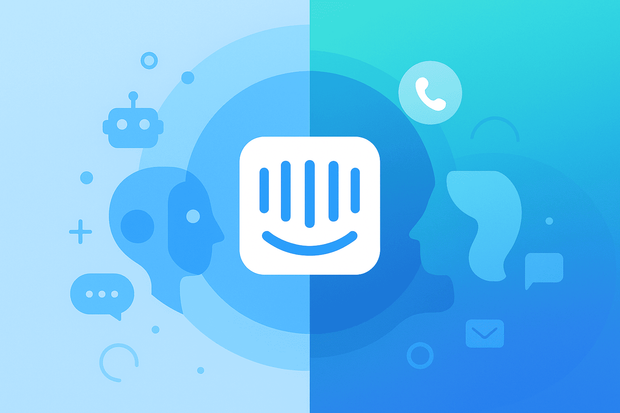A quick summary:
Intercom is an AI-powered customer service platform. It combines messaging, automation, ticket management & more. The platform includes Fin AI and Copilot to scale support. It integrates with CRMs, analytics and messaging apps & is ideal for teams that want fast, personalized support.
If you’ve ever looked into AI customer service tools, you’ve definitely heard of Intercom. But what is the Intercom platform and why is it becoming a go-to solution for modern businesses?
As a leading customer service software, Intercom helps companies deliver fast, personalized support across multiple channels. If you understand how it works and how it connects to other tools, you’re halfway towards building an efficient and scalable support system.
In this guide, we’ll explore:
- What are the key features of Intercom
- How do businesses use Intercom for customer support
- How Intercom compares to other chat platforms
- What are the limitations of using Intercom
What is Intercom?
Intercom is an AI customer support platform that helps businesses connect with customers through chat, email and messaging apps through one shared inbox. It combines automation, a shared inbox and Fin AI, its intelligent support bot, to deliver faster, more personal customer service.

Founded in 2011, Intercom began as a simple in-app chat tool that makes online communication more human. Over time, Intercom evolved into a complete customer communication solution, trusted by thousands of companies worldwide.
Today, Intercom’s mission is to blend AI, messaging and human support to make customer service easier, faster and more human.
Key features of Intercom
Intercom has messaging, automation and AI features that differentiate it from other customer service tools. If you want your support team to work faster and build better customer relationships, take a look at Intercom’s key features.
Messaging and conversations
Intercom’s biggest strength is its messaging system. It helps businesses connect with customers through live chat widgets on websites and support emails.
Also, all Intercom messages flow into a shared inbox, giving support teams full visibility into every conversation. Agents can collaborate, assign replies, and track context in real time.
Automation and workflows
Intercom’s automation features help support teams save time and stay organized. Teams can set up assignment rules and SLAs and use workflows to make sure every conversation reaches the right agent automatically. Intercom also has workload management so that managers can control routing.
AI customer support
Intercom leads in the customer support world because of Fin, its AI-powered support bot that takes customer conversation management to the next level. Fin AI resolves FAQs instantly, escalates complex issues to human agents, and works across tickets, email, and live chat.
Reporting
Intercom’s analytics and reporting tools give support teams a complete, real-time view of their performance. It combines AI-powered insights with flexible data visualization to help monitor response times, resolution rates, customer satisfaction (CSAT), and even see how AI and human support work together in one report.
Integrations
Intercom connects with the tech stack support teams already use. For teams that want to extend Intercom beyond chat and email, the correct CRM, analytics and messaging app integrations play a critical role in improving your overall support operations.
Every app and integration is available in the Intercom App Store.
Explore different Intercom integrations for your business
How do businesses use Intercom
For years, businesses used Intercom to run their entire customer support workflows across different teams and business growth stages.

Below is a summary of Intercom’s most common use cases for businesses:
- Customer support: Business mainly use Intercom to manage all customers conversations from live chat and email in one shared inbox.
- Sales and lead generation: Intercom helps sales teams connect with prospects directly through live chat. An example of this is when a website visitor lands on a platform’s pricing page and a chatbot welcomes them, collects their details and connects them to a sales agent.
- Onboarding: Businesses can use Intercom to simplify user onboarding. Intercom offers interactive tools that guide, educate, and re-engage customers. Its Product Tours walk users through key features step by step, while mobile carousels welcome app users and spotlight actions they might miss.
- Product and in-app messaging: Companies use Intercom’s Messenger widget to deliver updates, collect feedback, and offer real-time support directly inside their product or website.
- Self-service: Intercom helps businesses scale their customer service with its built-in help center and AI-powered features. Customers can find answers instantly, while AI escalates unresolved issues to human agents. An example of this is a customer searching for “billing” in the help center getting an AI-generated answer with links to relevant articles.
- Human + AI escalation flows: Businesses using Intercom combine human expertise and automation by letting Fin handle repetitive questions and escalating complex ones to human agents. For example, Fin AI answers a refund question, then passes the case to an agent when the customer requests a custom billing adjustment.
What are the key Intercom alternatives
When comparing Intercom vs other customer service platforms, businesses often look for tools that combine automation, AI, and ease of use. Many of Intercom competitors offer all three, and at different price points.
Here’s a quick comparison between Intercom and its top alternatives: HubSpot Service Hub, Zendesk, Freshdesk, Drift, and LiveChat.
| Platform | Key features | Ease of use | Pricing | Integrations |
|---|---|---|---|---|
| HubSpot Service Hub | Omnichannel help desk, Breeze AI | Very user-friendly for HubSpot CRM users | Free tier available, paid plans from $20/seat | 1,500+ integrations |
| Zendesk | Advanced ticketing, Conversational AI agents | Extensive customization and add-ons needed | Tiered pricing starting at $19/agent | Large app marketplace, strong API support |
| Freshdesk | Omnichannel support, Freddy AI | Clean and intuitive interface | Plans start at $18/agent | Integrates with CRMs and connector apps to extend its capabilities |
| Drift | AI live chat agent, automatic routing | Easy for sales teams | Usage-based pricing | Limited |
| LiveChat | AI customer service chatbots, Real-time chat | Lightweight and easy to adopt | Starts at $25/agent | Has >200 integrations with famous apps |
Why choose Intercom for customer service
Choosing the right customer service platform depends on your team’s size, goals, and the kind of experience you want to deliver. Intercom stands out for businesses because of its advanced AI and messaging features.
Businesses love it because it’s easy to extend its capabilities. Plus, when connected to many channels, it acts as an omnichannel support hub.

Here’s why businesses choose Intercom for customer service:
- AI messaging: Fin AI delivers accurate answers to customers, while Copilot assists agents with instant insights and message drafts.
- Unified platform: Intercom unifies chat, automation, analytics, and help desk features in one platform, making it better than patchwork solutions that depend on disconnected tools. It also integrates with multiple external apps.
- Strong developer ecosystem: Intercom’s open APIs and developer-friendly environment allow businesses to extend its capabilities, build custom workflows, and integrate with niche apps.
- Continuously improving AI: Fin, Intercom’s AI agent, is regularly updated with better natural language understand and expanded use cases.
Some platforms offer simpler setups or lower entry costs. However, Intercom stands out for its AI, customization, and the ability to manage the entire customer experience from one place.
What are challenges of using Intercom?
While Intercom is one of the most advanced AI chatbot and customer messaging platforms, users often mention a few challenges to watch out for:
- Complexity: Setting up flows, rules, and integrations can take time, especially for teams new to automation or managing multiple websites using Intercom.
- Over-relying on AI and automation: AI can occasionally hallucinate or misinterpret messages, so teams need clear escalation paths for edge cases and human review.
- Integration: As businesses scale, syncing data between Intercom, CRMs, and messaging systems can be complex. This is where integrations become essential, not just a nice to have. Most growing teams rely on a small set of key Intercom integrations to centralize customer conversations, automate workflows, and avoid operational silos.
- Pricing unpredictability: Intercom’s usage-based and per-resolution pricing, especially with AI features, can make costs harder to calculate.
Intercom pricing
Intercom offers three main support plans, Essential, Advanced, and Expert, all powered by the Fin AI Agent at $0.99 per resolution. Its pay-per-resolution model makes it flexible for businesses of all sizes, from startups to large enterprises.
- Essential ($39/seat): Best for small teams. Includes Fin AI Agent, Messenger, shared inbox, ticketing, reports, and a help center.
- Advanced ($99/seat): Built for growing teams. Adds workflow automation, multiple inboxes, round-robin assignment, and multilingual help centers.
- Expert ($139/seat): Designed for large organizations. Includes all Advanced features plus SSO, HIPAA support, SLAs, and multi-brand functionality.
Explore more details on Intercom's pricing here.
Final thoughts
Intercom is one of the best customer service platforms on the market. It combines messaging features, automation, and AI to help businesses deliver better customer support. Its most famous selling point is Fin, the AI support chatbot that works alongside workflows, integrations, and analytics.
Octopods builds on Intercom’s foundation by connecting Intercom to messaging channels like WhatsApp, Instagram DMs, and Facebook Messenger.
Want to learn how the Octopods Intercom integration works?
FAQs
What is Intercom platform?
Intercom is an AI customer support platform that helps businesses engage with their customers through messaging, automation, and AI. It unifies customer conversations from different channels into a single, shared inbox, enabling real-time chat, AI-powered support, and automated workflows.
Is Intercom a CRM or a helpdesk tool?
Intercom is primarily a customer service and helpdesk platform, not a full CRM. It’s built to help businesses manage customer conversations, tickets, and support workflows through chat, email and messaging apps in 1 inbox.
Is Intercom only for customer support?
No, while Intercom is widely known as a customer support platform, it also offers powerful tools for sales, marketing, and customer engagement. Businesses use it to qualify leads, onboard users, announce new features, and automate follow-ups. Its combination of messaging, automation, and AI makes it useful across the entire customer lifecycle.
Is Intercom good for small businesses or startups?
Yes. Intercom is a great choice for small businesses and startups that want to deliver fast, personal customer support without building a large team.

